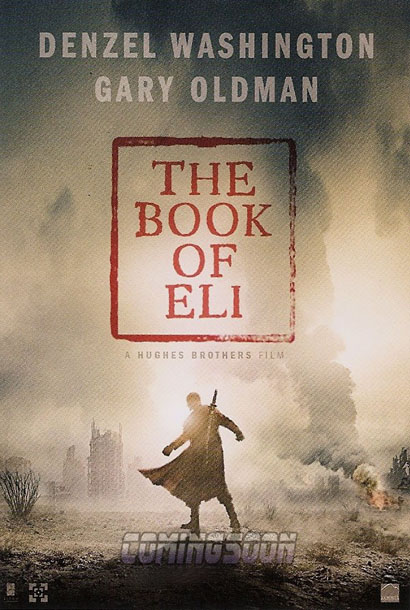A MOVIE NOT MADE IN HEAVEN
by Harry Hunter, movie rated “R,” length 1 hour 58 minutes

(Jan. 29, 2010) — The Book of Eli, starring Denzel Washington, is a dark, violent, post-apocalyptic film built on the foundation of the Christian religion. Having given that much of a hint, I may as well just say that Eli’s book is the Bible and that the story is about good versus evil. The thing is, there are dimensions to this conflict that could be interpreted as bearing on the nature of prophecy and the purposes of God.
I will not analyze the many arts and crafts involved in making the film—its merits as a work of art—but will deal simply with what the film meant to me. First, even under gray, hellish, brutally violent conditions, by faith a person with a purpose can persevere and overcome intimidating obstacles. At one point Eli even recites the 23rd Psalm: “. . . I will fear no evil . . . .” Good. Some may complain of didacticism, but I can appreciate comforting words about keeping faith.
A little higher up the ladder comes the question of divine guidance. We know Christians seek a higher influence in their lives, but we also know that sometimes Christians claiming to talk with God do misguided things. But Eli, like Moses and Noah, has heard a Voice and been given directions to follow, and he follows his Voice heroically, steadfastly, manfully. By their fruits ye shall know them.
The trouble with Eli starts with the suggestion in the film that the world devastation it follows was caused by the Book. That is to say, “The Flash,” as survivors call the end of civilization, may have resulted from a world-encompassing religious conflict somehow rooted in the Bible, which explains why the survivors were so fixated on destroying every Bible they could lay their hands on. They figured enough already–if this is where religion leads, religion is Public Enemy Number One, so burn the Book.
Bible prophecy has often been the basis for supposing that The End Is Near, and indeed the end of things has recurred throughout history, but in the Atomic Age visions of apocalypse seem particularly feasible and perhaps even unpreventable. Even now some Christians seem to view the creation of the state of Israel and the subsequent endless war as portending the soon second coming of the Lord. And The Book of Eli supports that view. That is the main trouble I have with Eli.
If enough people’s thinking is pointed toward the fulfillment of a prophecy of world devastation, centered on the environs of Jerusalem, those people might just be helping to bring that devastation upon us. I think of all the misguided Christians who have thought they were doing a godly thing, fulfilling the will of God even, by donating money to pay for plane tickets and other expenses for Jews to emigrate from Russia to Israel, where their presence then became felt in ever more incessant demands for land on which to settle the new immigrants, which led to ever more conflict with the Palestinians, which was a causative factor in the devastation of 9-11-2001 and which continues to be cited by our enemies as a main reason for terrorism against the United States.
Well, then, it must all be the will of God playing out before our eyes, so bring it on, some might say. As Denzel Washington’s Eli says at a critical juncture, “God is good—always.” If the ever-simmering, often boiling conflict in the Middle East is God’s will, then why not assist God by throwing some wood on the fire? Don’t foil God’s will by trying to make peace, see?
But I wish to protest such zealous devotion. Are the devotees of Judgment Day absolutely sure they know the mind of God in this matter? Yes, God is always good, but is it good to march humanity toward the cliff of global destruction just because God does not stretch out His hand to stop the parade? If Judgment Day is coming soon, no one can stop it, and it does not need our help to happen. In the meantime, let there be peace in the Middle East.


Peace in the Middle East depends on the muslims. It will happen when they want peace, and not until.